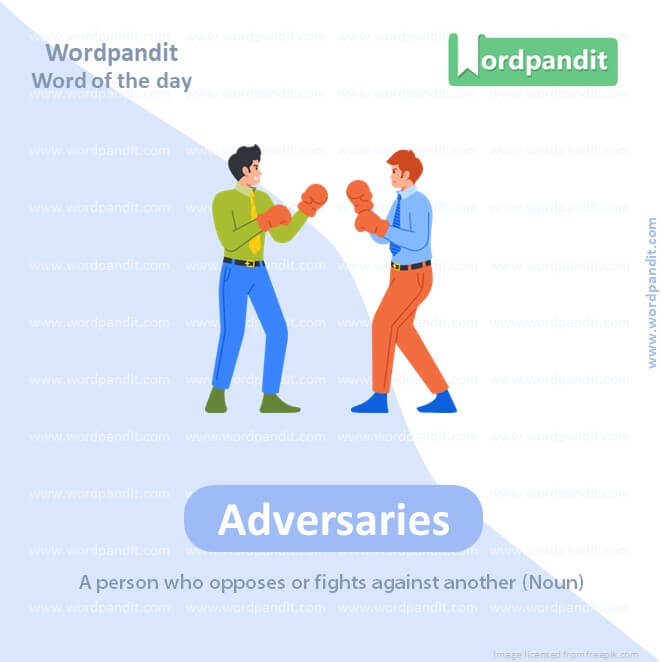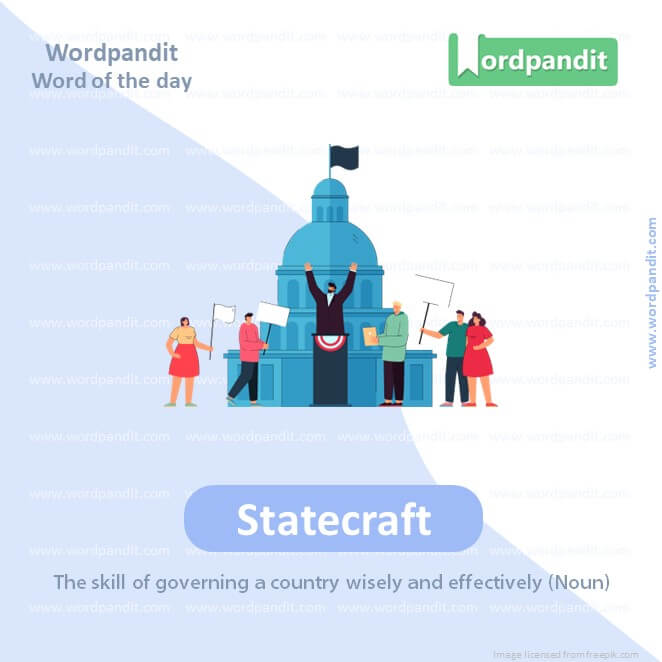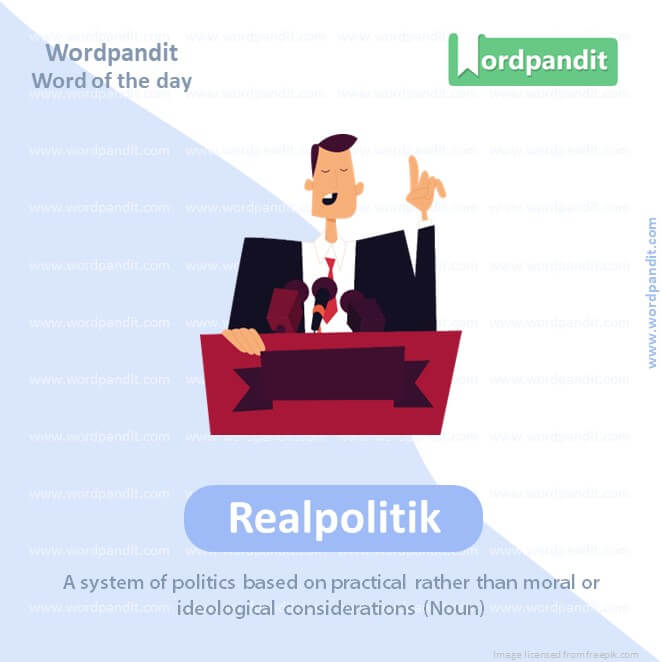Daily Vocabulary Words: List of Daily Used Words in Leading Indian Newspapers
Hi there. Welcome to this special section @ Wordpandit. Our endeavour here is straightforward: highlighting daily vocabulary words that you would come across in leading newspapers in the country. We have included the following newspapers in our selection:
• The Times of India
• The Economic Times
• Hindustan Times
• Mint
• Indian Express
We are putting in extensive work to develop your vocabulary. All you have to do is be regular with this section and check out this post daily. This is your repository of commonly used words; essentially, we are posting a list of daily used words. Hence, this has significant practical application as it teaches you words that are commonly used in leading publications mentioned above.
Visit the website daily to learn words from leading Indian newspapers.

WORD-1: Adversaries
CONTEXT: The results of the five state Assembly elections will be out today, and then the preparations for the parliamentary elections due in 2024 will begin in all seriousness. During this election fever, where no stone will be left unturned to win the elections and all means, fair and foul, will be used by political adversaries to outsmart others, I am reminded of the fountainhead of our statecraft, who lived some 2,000 years ago, and deeply meditated on the intricacies of politics and the rules that should guide the winner.
SOURCE: Hindustan Times
EXPLANATORY PARAGRAPH: Imagine you have someone in your class who always wants to win against you in games. That person is like an ‘adversary’. It’s someone who competes against you or tries to win over you.
MEANING: A person who opposes or fights against another (noun).
PRONUNCIATION: AD-ver-sair-ees
SYNONYMS: Opponent, Rival, Enemy, Antagonist, Foe
USAGE EXAMPLE:
1. In the chess tournament, she faced her main adversary in the final round.
2. Superheroes often fight against their adversaries to save the world.
3. Political debates often involve adversaries discussing different viewpoints.
4. In sports, teams usually view their competitors as adversaries.

WORD-2: Outsmart
CONTEXT: The results of the five state Assembly elections will be out today, and then the preparations for the parliamentary elections due in 2024 will begin in all seriousness. During this election fever, where no stone will be left unturned to win the elections and all means, fair and foul, will be used by political adversaries to outsmart others, I am reminded of the fountainhead of our statecraft, who lived some 2,000 years ago, and deeply meditated on the intricacies of politics and the rules that should guide the winner.
SOURCE: Hindustan Times
EXPLANATORY PARAGRAPH: When you think really cleverly to solve a puzzle faster than your friend, you ‘outsmart’ them. It means being smarter or more clever than someone else.
MEANING: To defeat or gain an advantage over by being more clever (verb).
PRONUNCIATION: out-SMART
SYNONYMS: Outwit, Outmaneuver, Outthink, Outfox, Eclipse
USAGE EXAMPLE:
1. The detective managed to outsmart the thief by setting a clever trap.
2. In the game of chess, you have to outsmart your opponent to win.
3. She outsmarted her competitors in the debate with her quick thinking.
4. The cunning fox outsmarted the hunter.

WORD-3: Statecraft
CONTEXT: The results of the five state Assembly elections will be out today, and then the preparations for the parliamentary elections due in 2024 will begin in all seriousness. During this election fever, where no stone will be left unturned to win the elections and all means, fair and foul, will be used by political adversaries to outsmart others, I am reminded of the fountainhead of our statecraft, who lived some 2,000 years ago, and deeply meditated on the intricacies of politics and the rules that should guide the winner.
SOURCE: Hindustan Times
EXPLANATORY PARAGRAPH: Statecraft is like knowing how to be a good leader or king of a country. It’s about making wise decisions, solving problems, and knowing how to talk to other countries.
MEANING: The skill of governing a country wisely and effectively (noun).
PRONUNCIATION: STATE-kraft
SYNONYMS: Governance, Diplomacy, Politics, Statesmanship, Leadership
USAGE EXAMPLE:
1. The President is admired for his excellent statecraft.
2. Learning statecraft is important for anyone entering politics.
3. The course on statecraft covered both history and international relations.
4. Statecraft involves making tough decisions for the good of the country.
WORD-4: Intricacies
CONTEXT: The results of the five state Assembly elections will be out today, and then the preparations for the parliamentary elections due in 2024 will begin in all seriousness. During this election fever, where no stone will be left unturned to win the elections and all means, fair and foul, will be used by political adversaries to outsmart others, I am reminded of the fountainhead of our statecraft, who lived some 2,000 years ago, and deeply meditated on the intricacies of politics and the rules that should guide the winner.
SOURCE: Hindustan Times
EXPLANATORY PARAGRAPH: Intricacies are like the small, detailed parts of a big, complicated puzzle. They are the little things that make something interesting but also a bit hard to understand.
MEANING: Complex and detailed parts or elements (noun).
PRONUNCIATION: IN-tri-ka-sees
SYNONYMS: Complexities, Nuances, Details, Subtleties, Complications
USAGE EXAMPLE:
1. The intricacies of the machine fascinated the engineers.
2. Understanding the intricacies of the law requires careful study.
3. The artist’s painting captured the intricacies of the natural landscape.
4. The book explains the intricacies of human psychology.

WORD-5: Hailed
CONTEXT: I am, of course, talking of Chanakya, also known as Kautilya, who lived in the fourth century BCE, some two millennia before Machiavelli, who is generally hailed in the West as the founder of realpolitik. In any case, Chanakya’s achievements through the use of statecraft, which could be unsentimentally amoral, were of a much higher order. In the course of one lifetime, he groomed a king, deposed another, worked to throw out the mighty Greeks, united a fractious territory, put his nominee on the throne of Magadha, and helped consolidate a great empire—the Mauryan Empire—extending from the western pass adjoining Afghanistan to the Bay of Bengal and stretching till southern India, arguably the first true empire in India’s history.
SOURCE: Hindustan Times
EXPLANATORY PARAGRAPH: When you ‘hail’ something, it’s like shouting out loud how great it is. Imagine telling everyone how awesome your favorite superhero is; that’s like hailing them.
MEANING: Praised enthusiastically and publicly (verb).
PRONUNCIATION: HAY-led
SYNONYMS: Acclaimed, Praised, Celebrated, Lauded, Extolled
USAGE EXAMPLE:
1. The new movie was hailed as a masterpiece by critics.
2. She was hailed as a hero for her bravery.
3. The invention was hailed as a major breakthrough in science.
4. The athlete was hailed for his outstanding performance.

WORD-6: Realpolitik
CONTEXT: I am, of course, talking of Chanakya, also known as Kautilya, who lived in the fourth century BCE, some two millennia before Machiavelli, who is generally hailed in the West as the founder of realpolitik. In any case, Chanakya’s achievements through the use of statecraft, which could be unsentimentally amoral, were of a much higher order. In the course of one lifetime, he groomed a king, deposed another, worked to throw out the mighty Greeks, united a fractious territory, put his nominee on the throne of Magadha, and helped consolidate a great empire—the Mauryan Empire—extending from the western pass adjoining Afghanistan to the Bay of Bengal and stretching till southern India, arguably the first true empire in India’s history.
SOURCE: Hindustan Times
EXPLANATORY PARAGRAPH: Realpolitik is when countries make decisions based on what is really possible, not just what they wish could happen. It’s like choosing to build a small sandcastle because you don’t have enough sand for a big one.
MEANING: A system of politics based on practical rather than moral or ideological considerations (noun).
PRONUNCIATION: RAY-al-poh-li-teek
SYNONYMS: Pragmatism, Practicality, Realism, Machiavellianism, Expediency
USAGE EXAMPLE:
1. The leader’s foreign policy was guided by realpolitik.
2. Realpolitik often involves tough decisions that prioritize national interest.
3. In international relations, realpolitik plays a crucial role.
4. The diplomat was known for his realpolitik approach to negotiations.
WORD-7: Amoral
CONTEXT: I am, of course, talking of Chanakya, also known as Kautilya, who lived in the fourth century BCE, some two millennia before Machiavelli, who is generally hailed in the West as the founder of realpolitik. In any case, Chanakya’s achievements through the use of statecraft, which could be unsentimentally amoral, were of a much higher order. In the course of one lifetime, he groomed a king, deposed another, worked to throw out the mighty Greeks, united a fractious territory, put his nominee on the throne of Magadha, and helped consolidate a great empire—the Mauryan Empire—extending from the western pass adjoining Afghanistan to the Bay of Bengal and stretching till southern India, arguably the first true empire in India’s history.
SOURCE: Hindustan Times
EXPLANATORY PARAGRAPH: When something is ‘amoral’, it’s like it doesn’t know about right or wrong. It’s not about being bad; it’s just not thinking about whether something is good or bad.
MEANING: Lacking a sense of right and wrong, neither moral nor immoral (adjective).
PRONUNCIATION: ay-MOR-al
SYNONYMS: Unethical, Immoral, Unprincipled, Nonmoral, Indifferent
USAGE EXAMPLE:
1. The robot’s actions were amoral since it couldn’t understand ethics.
2. In nature, the actions of animals are often considered amoral.
3. The company was criticized for its amoral business practices.
4. He adopted an amoral approach to decision-making.
WORD-8: Fractious
CONTEXT: I am, of course, talking of Chanakya, also known as Kautilya, who lived in the fourth century BCE, some two millennia before Machiavelli, who is generally hailed in the West as the founder of realpolitik. In any case, Chanakya’s achievements through the use of statecraft, which could be unsentimentally amoral, were of a much higher order. In the course of one lifetime, he groomed a king, deposed another, worked to throw out the mighty Greeks, united a fractious territory, put his nominee on the throne of Magadha, and helped consolidate a great empire—the Mauryan Empire—extending from the western pass adjoining Afghanistan to the Bay of Bengal and stretching till southern India, arguably the first true empire in India’s history.
SOURCE: Hindustan Times
EXPLANATORY PARAGRAPH: Imagine someone who gets upset or angry really easily and often argues. That person is ‘fractious’. It’s like being in a bad mood and not getting along with others.
MEANING: Easily irritated and prone to causing trouble (adjective).
PRONUNCIATION: FRAK-shus
SYNONYMS: Irritable, Quarrelsome, Grumpy, Contentious, Testy
USAGE EXAMPLE:
1. The fractious child was difficult to babysit.
2. In meetings, he often became fractious and argumentative.
3. The fractious debate ended with no agreement.
4. The cat became fractious when taken to the vet.
WORD-9: Incisive
CONTEXT: In addition, he wrote one of the world’s most incisive treatises on statecraft, the Arthashastra. Due to our lack of historical sensitivity, and the consequence of invasion and conquest—first the Muslims and then the British— sometime at the end of the Gupta empire in the 6th century CE, the Arthashastra was lost to posterity. It was rediscovered as late as 1905 by librarian Rudrapatna Shamasastry, in an uncatalogued group of ancient palm leaf manuscripts donated by an unknown pandit to the Oriental Research Institute, Mysore. It was only then that the world woke up to the greatness of India’s legacy in the field of political and economic theory.
SOURCE: Hindustan Times
EXPLANATORY PARAGRAPH: When someone is ‘incisive’, they can think and understand things quickly and clearly. It’s like being super smart and able to figure out puzzles really fast.
MEANING: Very clear-thinking and quick at understanding things (adjective).
PRONUNCIATION: in-SIGH-siv
SYNONYMS: Sharp, Keen, Astute, Perceptive, Insightful
USAGE EXAMPLE:
1. Her incisive comments always got to the heart of the matter.
2. The lawyer’s incisive questioning revealed the truth.
3. He was known for his incisive analysis of political issues.
4. The article was an incisive critique of the current policies.
WORD-10: Treatise
CONTEXT: In addition, he wrote one of the world’s most incisive treatises on statecraft, the Arthashastra. Due to our lack of historical sensitivity, and the consequence of invasion and conquest—first the Muslims and then the British— sometime at the end of the Gupta empire in the 6th century CE, the Arthashastra was lost to posterity. It was rediscovered as late as 1905 by librarian Rudrapatna Shamasastry, in an uncatalogued group of ancient palm leaf manuscripts donated by an unknown pandit to the Oriental Research Institute, Mysore. It was only then that the world woke up to the greatness of India’s legacy in the field of political and economic theory.
SOURCE: Hindustan Times
EXPLANATORY PARAGRAPH: A treatise is like a very long, detailed book about a special subject. Imagine writing a big book all about your favorite animals and everything about them.
MEANING: A written work dealing formally and systematically with a subject (noun).
PRONUNCIATION: TREE-tis
SYNONYMS: Dissertation, Essay, Thesis, Study, Monograph
USAGE EXAMPLE:
1. He wrote a comprehensive treatise on environmental science.
2. Her treatise on economics won several awards.
3. The professor recommended reading the treatise for deeper understanding.
4. The ancient treatise on medicine is still studied today.
Vocabulary Synonyms
In the intricate weave of language learning, ‘vocabulary synonyms’ emerge as a key element that adds depth and variety to expression. These different words with similar meanings enrich our vocabulary, enabling us to communicate with precision and clarity. However, grasping ‘vocabulary synonyms’ successfully warrants a systematic approach.
When approaching ‘vocabulary synonyms’, context is your compass. Engage with various reading materials like novels, newspapers, and digital content to explore and understand how these synonyms are used in different situations. This exposure will fortify your comprehension of ‘vocabulary synonyms’ and their usage nuances.
Employing memory-enhancing techniques can cement your grasp on ‘vocabulary synonyms’. Employing flashcards is an effective method where one side contains the word you know, and the other side has its synonyms. Also, creating mind maps, linking the known word to its various synonyms, can be an engaging way to learn ‘vocabulary synonyms’.
To master ‘vocabulary synonyms’, take an active role in application. Regular conversations, written communications, digital interactions – all of these offer ample opportunities to utilize learnt synonyms. This practice refines your application and accelerates internalization of ‘vocabulary synonyms’.
Embracing language exchange platforms or engaging with native speakers can provide invaluable feedback on the usage of ‘vocabulary synonyms’. This interaction can further enhance your understanding of the cultural idiosyncrasies of word usage.
In conclusion, learning ‘vocabulary synonyms’ is a rewarding pursuit that adds layers of complexity to your language skills. A thoughtful blend of diversified resources, memory tools, practice, and interactive learning can make the task of mastering ‘vocabulary synonyms’ an enjoyable and fruitful journey. Every synonym learnt paints your vocabulary with different shades of understanding, making your language canvas all the more vivid and spectacular!













